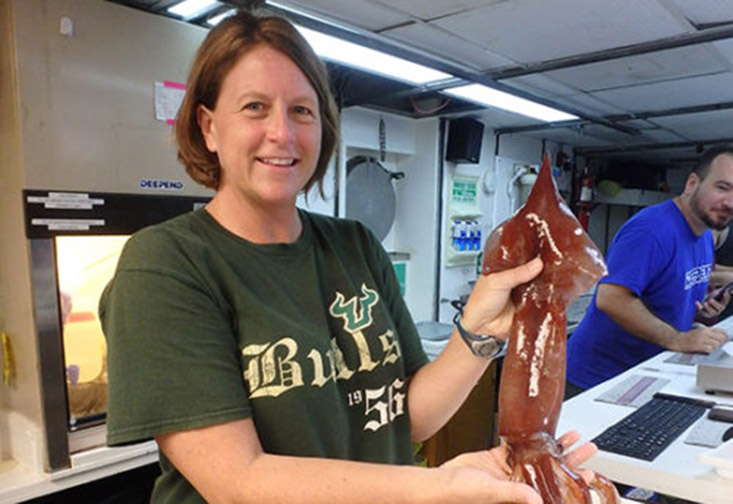When thousands of gallons of oil a day began spewing into the Gulf of Mexico after the Deepwater Horizon explosion, the scientific community rushed to measure the impact. Unfortunately, it became quickly apparent that little was known about the marine life that inhabited these waters.
Now that’s changed, thanks to the efforts of a group of research scientists, including USFSP Associate Biology Professor Heather Judkins. Next summer, they will embark on their next excursion to continue measuring the possible effects of the largest oil spill in the nation’s history.
The expedition is a continuation of the DEEPEND consortium’s work, which began with funding by the Gulf of Mexico Research Initiative from 2015 until this December. This work adds to a better understanding of marine life and ecosystems below 200 meters in this still largely mysterious body of water.
A $2.7-million grant awarded from the RESTORE Act will fund three DEEPEND cruises over the next five years. The RESTORE Act was established in the wake of the BP oil spill. The funds are designed to study, restore and protect natural resources and ecosystems in the Gulf Coast region.
“This will give us years of continued monitoring in the same sites with the same gear,” said Judkins. “It provides us with valuable baseline data. In case there’s another oil spill, we now have data for what the midwater column looks like.”
DEEPEND (Deep Pelagic Nekton Dynamics of the Gulf of Mexico) is a multi-year program to collect faunal data, trace contaminants from the oil spill and study the impacts on food webs to determine changes in the ecosystem and to marine life from the environmental disaster. It is a collaborative effort among researchers from around the Gulf of Mexico.
One of the consortium’s primary goals is to measure the abundance of marine life at different depths, which can provide insight into scarcity and feeding habits. To do this, the scientists use a MOCNESS (Multiple Opening Closing Net and Environmental Sensing System), which is towed behind a research ship with a series of nets that can be opened and shut independently so that each net samples a specific patch of water. When each net is brought on board the research vessel, the scientists gather the organisms and collect relevant data.
Judkins is an expert on cephalopods — marine mollusks such as squid, cuttlefish and octopuses. In addition to measuring how abundant the creatures are in the Gulf, she will be studying the age of the cephalopods and gathering information on what they eat.
“We’re literally exploring this unknown world,” said Judkins. “We’re still finding new organisms all the time. To be on the edge of this area of scientific exploration is really exciting.”
The data and findings from the trips are used by Judkins for publications and graduate student research. She said it also helps her undergraduate students connect information they are learning in the classroom to real-life scenarios.
“I’m always bringing back animals and stories,” she said. “It’s the real world application of the lessons they are learning.”
Judkins said she feels very fortunate to be part of the DEEPEND team, which has been together since 2011 and includes researchers from Nova Southeastern University, Florida International University, the National Systematics Lab (NOAA), Florida Atlantic University, Florida International University, Texas A&M University, the Naval Research Center and USF College of Marine Science.
“We’ve been together for so long and we work really well together,” said Judkins. “It’s great that we get to keep this program going and continue building one of the largest data sets in the world.”
